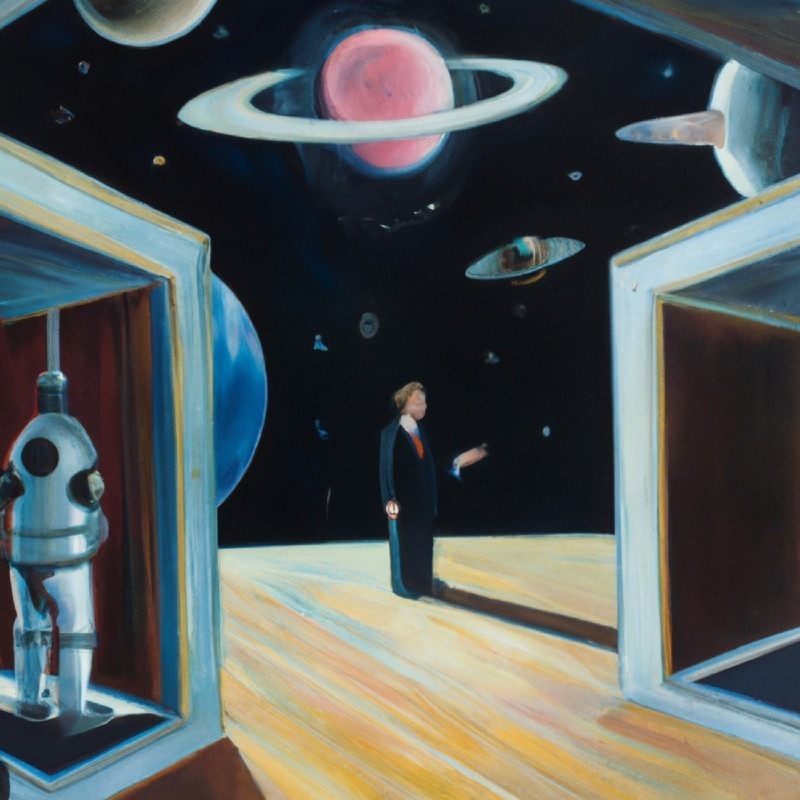
In the vast expanse of cinematic history, there are a few masterpieces that transcend their time, leaving an indelible mark on the collective consciousness. Stanley Kubrick’s “2001: A Space Odyssey” undoubtedly belongs to this elite league of films. Its enigmatic narrative, striking visuals, and profound themes continue to resonate with audiences, even more than five decades after its release. In an era of rapid technological advancements and existential questions about our place in the universe, Kubrick’s magnum opus remains as relevant as ever.
At its core, “2001: A Space Odyssey” is a contemplation on humanity’s evolution and its relationship with technology. The film presents a future where artificial intelligence, represented by the iconic character HAL 9000, challenges human agency and raises ethical dilemmas. This theme echoes in our present reality as we grapple with the increasing integration of AI and automation into our daily lives. Kubrick’s vision serves as a cautionary tale, urging us to reflect on the boundaries and responsibilities of technological progress.
Moreover, the film’s exploration of existential questions transcends its time and speaks directly to our human condition today. In an age where our lives are dominated by screens and virtual connections, “2001: A Space Odyssey” reminds us of the awe-inspiring mystery and vastness of the universe. It invites us to ponder the grandeur of cosmic forces and our place within them, reminding us that we are but a tiny fragment of the cosmic tapestry. In our pursuit of scientific knowledge and technological advancements, Kubrick’s film prompts us to seek a balance between our boundless curiosity and a profound sense of humility.
The visual and auditory aesthetics of “2001: A Space Odyssey” further contribute to its timeless allure. Kubrick’s meticulous attention to detail, combined with the groundbreaking special effects of the time, created a visual feast that continues to captivate audiences today. From the awe-inspiring monolith to the transcendent “Stargate” sequence, the film’s imagery still evokes a sense of wonder and curiosity. Its minimalistic yet evocative score, featuring Richard Strauss’s “Thus Spoke Zarathustra” and Johann Strauss’s “The Blue Danube,” enhances the film’s emotional impact, heightening the viewers’ engagement with the narrative.
Furthermore, the narrative structure of “2001: A Space Odyssey” challenges traditional storytelling conventions, inviting interpretation and intellectual engagement. Kubrick’s deliberate use of ambiguity and open-endedness leaves room for multiple readings and sparks discussions about the film’s meaning. It encourages viewers to question their own assumptions and explore the depths of their own consciousness. In an era of passive entertainment consumption, the film’s demand for active participation stands as a testament to its enduring relevance.
In many ways, “2001: A Space Odyssey” serves as a reminder of our inherent human curiosity and capacity for exploration. It invites us to embrace the unknown, to challenge our limits, and to strive for a future where our technological achievements are balanced by our ethical and spiritual growth. Kubrick’s masterpiece remains an inspiration for filmmakers, scientists, philosophers, and dreamers alike, fueling our collective imagination and reminding us that the quest for knowledge and self-discovery is a journey without end.
As we navigate the complexities of the 21st century, the relevance of “2001: A Space Odyssey” extends beyond the realm of cinema. It serves as a timeless guide, urging us to examine our values, our relationship with technology, and our place in the universe. In a world marked by rapid change and uncertainty, the film’s enduring themes continue to hold a mirror to our society and challenge us to contemplate the future we are creating.
One of the most remarkable aspects of “2001: A Space Odyssey” is its ability to inspire interdisciplinary conversations. It bridges the realms of science, art, philosophy, and beyond, sparking discussions that transcend traditional boundaries. Scientists ponder the possibility of extraterrestrial life and the nature of human evolution. Artists explore the interplay of visuals and sound, contemplating the boundaries of creativity. Philosophers delve into the film’s existential inquiries, contemplating the essence of human existence. Kubrick’s masterpiece serves as a catalyst for these dialogues, encouraging us to seek knowledge and understanding across disciplines.
The film’s enduring relevance also lies in its portrayal of human potential. As we witness the evolution of Dave Bowman, the film’s protagonist, we are reminded of the endless possibilities for growth and transformation that lie within each of us. From our earliest ancestors to our future selves, “2001: A Space Odyssey” traces our journey of self-discovery and evolution. It reminds us that our future is not predetermined, but rather shaped by our choices, our actions, and our capacity for growth.
In today’s world, where technological advancements continue to reshape our lives at an unprecedented pace, the cautionary tale of HAL 9000 resonates deeply. As artificial intelligence becomes increasingly integrated into our societies, we must grapple with the ethical implications and ensure that our creations serve humanity’s best interests. “2001: A Space Odyssey” serves as a reminder of the importance of responsible innovation, urging us to approach technological progress with a deep sense of responsibility and foresight.
Furthermore, the film challenges us to reevaluate our relationship with technology and the role it plays in our lives. In an age where we are constantly connected, “2001: A Space Odyssey” prompts us to question the impact of technology on our humanity. It encourages us to find a balance between the convenience and connectivity offered by our digital tools and the need for authentic human connection, introspection, and contemplation. It reminds us that amidst the complexities of the digital age, we must not lose sight of our essential humanity.
In conclusion, “2001: A Space Odyssey” stands as a cinematic masterpiece that transcends time, captivating audiences and provoking profound reflection. Its exploration of humanity’s evolution, the boundaries of technology, and our place in the universe continues to hold immense relevance in today’s world. As we navigate the challenges and opportunities of the digital age, Kubrick’s visionary film serves as a guiding light, inviting us to embrace our curiosity, challenge our assumptions, and envision a future that embodies both technological progress and our shared humanity.
Let us heed the call of “2001: A Space Odyssey” and embark on our own odyssey of self-discovery, innovation, and collective evolution. For in the end, it is not just a film—it is an invitation to reimagine our world and shape the future that awaits us.
